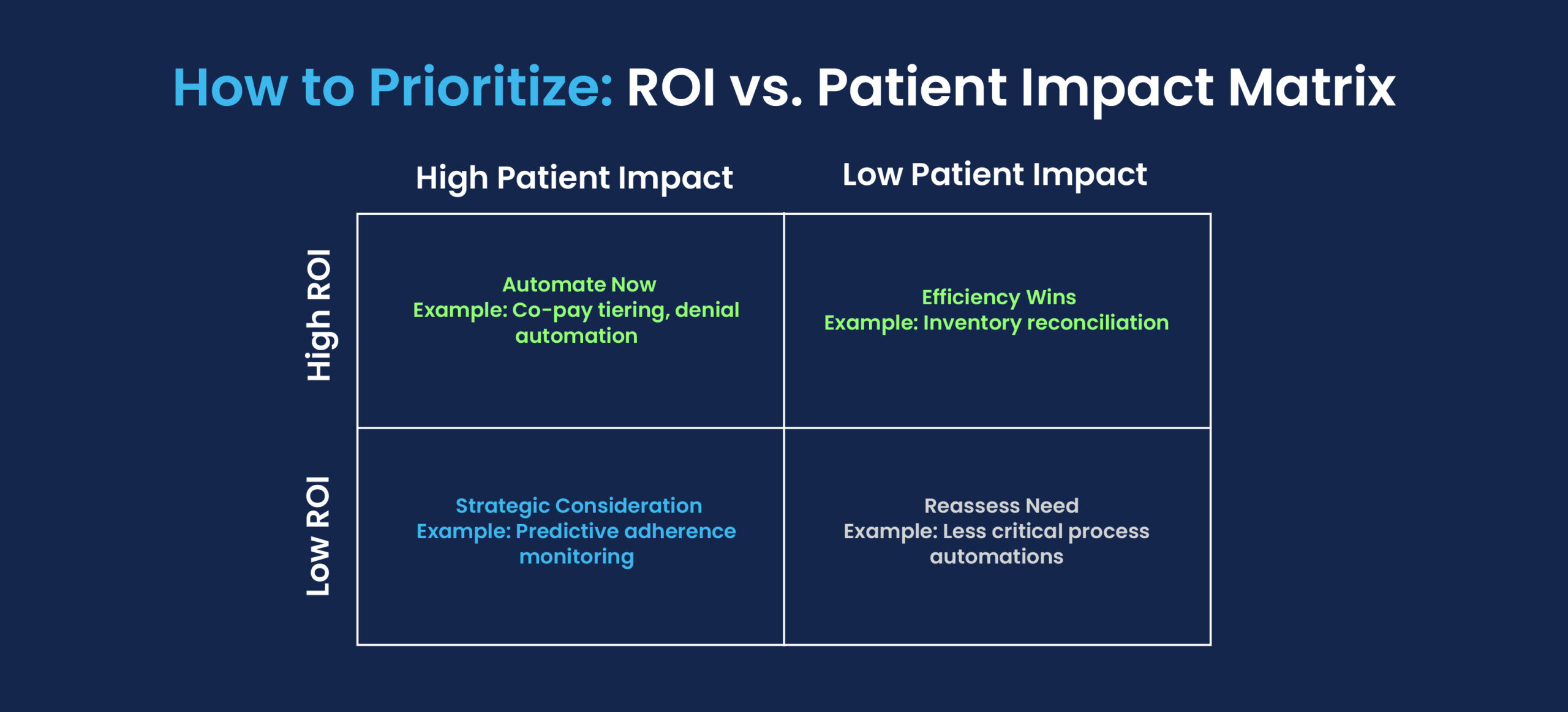7 Overlooked Automation Opportunities Driving Digital Transformation in Specialty Pharmacy

- September 8, 2025
In 2025, specialty drug spend is projected to account for more than 50 percent of the total U.S. pharmacy spend, according to the Drug Channels Institute. Yet, behind this growing investment lies a troubling reality: many specialty pharmacies still rely on manual workflows that slow care, create friction, and put patient outcomes at risk. In an industry where each prescription may represent a life-altering therapy, inefficiencies are more than operational challenges. They can mean delayed treatments, mounting stress for patients, and lost opportunities for better health outcomes. Digital transformation in specialty pharmacy has often focused on the headline innovations like EHR integration and electronic prior authorizations.
However, there is a whole layer of untapped, high-impact automation opportunities that rarely make it into the conversation.This blog uncovers seven overlooked automation opportunities that can drive both ROI and patient value, and offers a framework for prioritizing them so that technology serves not just the system but the people in it.
The Overlooked 7: Driving Digital Transformation in Specialty Pharmacy
1. Denial Tracking and Root-Cause Automation in the Digital Transformation of Specialty Pharmacy
Denied claims are more than just administrative headaches. Each one can delay treatment, add financial stress, and erode trust between patients and providers. Yet, in many specialty pharmacies, denials are still tracked manually or addressed only after they have piled up.
Automation can change this dynamic entirely. By using technologies that scan denial reasons, flag recurring patterns, and recommend next steps, pharmacies can shift from reactive problem-solving to proactive prevention. When denial data is integrated with prior authorization workflows, the same issues that once slowed care can be avoided before they happen. This approach does not just save time. It protects patient access to therapies, strengthens operational resilience, and moves the digital transformation in specialty pharmacy from concept to measurable impact.
2. Inventory Reconciliation and Expiry Risk Monitoring
For specialty pharmacies in the US, inventory is more than just stock on shelves; it is a lifeline for patients who cannot afford delays or disruptions. Yet many still rely on manual checks that miss early signs of overstocking, understocking, or looming expiry dates.
By introducing smart automation tools that combine IoT tracking with AI-driven forecasting, pharmacies can spot risks before they become problems. This not only safeguards patient access but also reduces costly waste, creating a more reliable and sustainable supply chain.
3. Co-Pay Tiering and Intelligent Affordability Matching
For many patients relying on specialty pharmacy in the US, the cost of treatment can be as overwhelming as the diagnosis itself. Unexpected out-of-pocket expenses often force people to delay or abandon therapy altogether.
Automation can change this by instantly assessing co-pay tiers and connecting patients to manufacturer coupons, financial assistance, or affordability programs in real time. This approach not only reduces the financial strain but also helps patients stay on their treatment path, improving patient adherence and long-term health outcomes.
4. Predictive Adherence Monitoring
One of the most powerful outcomes of the digital transformation in specialty pharmacy is the ability to predict challenges before they happen. By analyzing patient behavior and refill patterns, pharmacies can identify when adherence is at risk well before a missed dose occurs.
Pairing this insight with timely SMS or email reminders ensures patients receive the right nudge at the right moment, helping them stay on track with treatment and improving long-term health outcomes.
5. Digital Benefits Reverification for Refill Cycles
In the fast-paced world of high-cost therapies, even small disruptions can delay care. Patients often face unexpected pauses in their refill cycles when benefits or coverage change without prior warning. As part of the digital transformation in specialty pharmacy, automation can re-verify benefits before each refill cycle, ensuring that issues are caught and resolved early.
By integrating this process with CRMs or patient-facing mobile apps, pharmacies can send timely alerts, prevent last-minute surprises, and keep treatments on track without unnecessary stress for patients.
6. Escalation Routing for Complex Cases
In specialty care, timing can make all the difference. While many cases follow routine workflows, some require urgent attention to prevent serious consequences. As part of the digital transformation in specialty pharmacy, AI-powered smart triage can identify high-risk or complex cases in real time and route them directly to human experts.
By setting clear clinical rules and risk thresholds, pharmacies can ensure that urgent needs are met without delay, safeguarding patient health while maintaining operational efficiency.
7. Audit-Ready Documentation Automation
For any specialty pharmacy in the US, preparing for compliance audits can be a time-consuming and stressful process. Weeks are often spent gathering documents, formatting reports, and double-checking requirements.
Automation can change this entirely by collecting, organizing, and formatting the necessary documentation in real time. This not only saves valuable staff hours but also reduces the risk of errors, ensuring pharmacies are always audit-ready while focusing more energy on patient care.

Build vs. Buy: What to Ask Before Automating
The decision to build automation solutions or invest in a vendor platform is critical, especially while exploring digital transformation in specialty pharmacy. Beyond cost, it is about long-term compatibility, scalability, and ease of use. Ask whether the solution integrates smoothly with the current CRM and EHR systems.
Ensure workflows can be tailored to the business’s needs without relying heavily on developers. Confirm that the automation logic is transparent and compliant for audits. Finally, understand how the system manages exceptions and urgent escalations, as these moments often define the quality of care and operational resilience.
Wrapping Up
Speed matters, but it is not the only measure of success. True digital transformation in specialty pharmacy means designing systems that are resilient, transparent, and built around patients. Automation should remove friction, not obscure decisions. It should surface the right alerts, route the hardest cases to people, and make every handoff cleaner and kinder.
Leading tech companies are helping specialty pharmacies by delivering interoperable platforms, real-time intelligence, and audit-ready workflows that respect clinical nuance and regulatory demands. They focus on outcomes and partner with operations and clinical teams to ensure solutions actually work in practice.
At Neutrino Tech Systems, we help specialty pharma companies globally achieve seamless operations with top-notch AI-powered digital transformation solutions. Be it data intake, benefits verification, fulfillment, adherence, CRM, and billing, our team of experts ensures data flows rather than stalls. AI helps triage and predict risk, while configurable rules preserve human oversight.
The result is not just faster processing but steadier access, fewer patient drop-offs, and more time for clinicians to do what matters most. Orchestration, not automation alone, delivers lasting change. If you are ready to move from fragmented processes to coordinated care, let us build that future of connected care with you.
